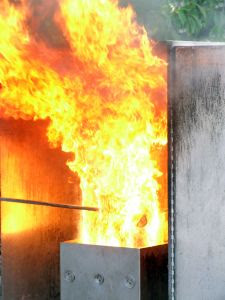 සියළුම පරිගණක ප්රොසෙසර වලට බලපාන පුධානම සතුරා වන්නේ උෂ්ණත්වයයි. ඔබේ පරිගණකය ගලවා බැලුවොත් ප්රොසෙසරය මත සවිකර තිබෙන හීට් සින්ක් සහ පංකා දැකිය හැකිවේවි. මේ උෂ්ණත්වයෙන් ප්රොසෙසරයේ කාර්යක්ෂමතාවය අඩුවීම අවම කිරීමටයි.
සියළුම පරිගණක ප්රොසෙසර වලට බලපාන පුධානම සතුරා වන්නේ උෂ්ණත්වයයි. ඔබේ පරිගණකය ගලවා බැලුවොත් ප්රොසෙසරය මත සවිකර තිබෙන හීට් සින්ක් සහ පංකා දැකිය හැකිවේවි. මේ උෂ්ණත්වයෙන් ප්රොසෙසරයේ කාර්යක්ෂමතාවය අඩුවීම අවම කිරීමටයි.
මෙම උෂ්ණත්ව ගැටළුව සඳහා විසඳුමක් ලෙස නාසා ආයතනය අධික උෂ්ණත්වයට ඔරොත්තු දෙන චිපයක් නිර්මාණය කර තිබෙන බව ආරංචියි! සිලිකන් කාබයිඩ් මගින් නිපදවා ඇති මෙම චිපය ෆැරන්හයිට් අංශක 1112ක උෂ්ණත්වයකට පවා ඔරොත්තු දෙන බව සඳහන්. මූලික පරීක්ෂණ මගින් ෆැරන්හයිට් අංශක 932ක උෂ්ණත්වයක පැය 1700ක කාලයක් පුරා මෙම චිපයක් ක්රියාත්මක කර තිබෙනවා. මේ පරීක්ෂණත් වල සාර්ථකත්වය සමග අනාගතයේදී පංකා නොමැති අධිවේගී චිප් පවා ලබාගන්නට හැකිවේය යන්න බොහෝ දෙනාගේ බලාපොරොත්තුවයි.
ගිස්මෝඩෝ මගිනි.
Heat is the main enemy of all processors. If you take your PC apart, you’ll see heat sinks and fans dealing with this – so it reduces the effect on processor efficiency.
The latest reports say that NASA is developing a Silicon Carbide chip that’ll be able to face extreme temperatures like 1112 degrees Fahrenheit. In preliminary tests, the chip operated at a temperature of 932 degrees Fahrenheit for 1700 hours. With the success of these experiments, many hope that fan less high speed processors will be available in a short time.
Via Gizmodo
the most important thing about this is not fan less computer,important thing about this is we could break the barrier of making the chip even smaller without increasing the working temperature,and have more speed, would be a great step for space research as well
As the developers of traditional microprocessors are slowly, but surely, approaching the limits of improving their devices that use the “on” & “off” electrical signal flow in semi-conductors, computers of the future will use quantum-mechanical properties of materials.
Such computers are known as Quantum Computers, and currently, a type of quantum computers, known as Optical Computers is in early development stages.
The optical computer uses the spin of photons to process data. The photons will not only have spin quantum number of 1 or 0, but also of a combined 1/0 state. These units are called qubits.
Heat generation inside optical computers is lower than in traditional computers.